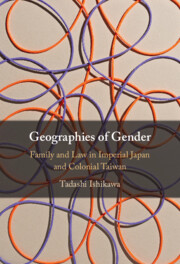Book contents
- Geographies of Gender
- Geographies of Gender
- Copyright page
- Dedication
- Contents
- Figures and Maps
- Acknowledgments
- Note on the Text
- Abbreviations
- Introduction
- 1 The Woman Question and Interwar Japan’s International Engagements
- 2 Empire Apart, Empire Together
- 3 Becoming a Taiwanese Man
- 4 When the Hearth Was at Once Warm and Cold
- 5 Freedom in a State of Flux
- 6 Stories Marginal Women Wove
- Conclusion
- Bibliography
- Index
5 - Freedom in a State of Flux
Published online by Cambridge University Press: 09 January 2025
- Geographies of Gender
- Geographies of Gender
- Copyright page
- Dedication
- Contents
- Figures and Maps
- Acknowledgments
- Note on the Text
- Abbreviations
- Introduction
- 1 The Woman Question and Interwar Japan’s International Engagements
- 2 Empire Apart, Empire Together
- 3 Becoming a Taiwanese Man
- 4 When the Hearth Was at Once Warm and Cold
- 5 Freedom in a State of Flux
- 6 Stories Marginal Women Wove
- Conclusion
- Bibliography
- Index
Summary
This chapter uncovers the unintended trajectory of Taiwanese women’s freedom among younger adopted daughters in the Japanese colonial courts. Family-centric, gender-based physical unfreedom continued to be one of the salient administrative and legal problems in Taiwan from the precolonial period to the late 1910s. Male household heads were not ready to follow the judicial construction of women’s freedom of movement during the early to mid-1920s. However, Japanese judges involved with female litigants shifted their focus to women’s freedom of choice – defined by intent and contractual freedom among adopted daughters – as a new boundary delineating their relationships with households in civil and criminal cases in the late 1920s. Women’s choice continued to be a central point of dispute when adopted daughters became targets of their parents and strangers. These daughters’ ambiguous capacity regarding their age, class background, and sexual integrity was misrepresented to legitimize their adverse labor and life conditions, including sex work. Yet, it was within the flexible contours of choice that the courts protected women’s agency, which, in turn, became a constitutive part of colonial history.
Keywords
- Type
- Chapter
- Information
- Geographies of GenderFamily and Law in Imperial Japan and Colonial Taiwan, pp. 185 - 218Publisher: Cambridge University PressPrint publication year: 2025

